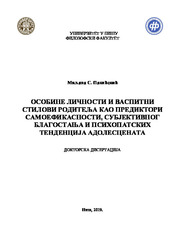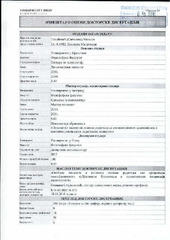Приказ основних података о дисертацији
Osobine ličnosti i vaspitni stilovi roditelja kao prediktori samoefikasnosti, subjektivnog blagostanja i psihopatskih tendencija adolescenata
| dc.contributor.advisor | Stojiljković, Snežana | |
| dc.contributor.other | Todorović, Jelisaveta | |
| dc.contributor.other | Opsenica Kostić, Jelena | |
| dc.contributor.other | Zlatanović, Ljubiša | |
| dc.contributor.other | Milovanović, Radmila | |
| dc.creator | Pavićević, Miljana | |
| dc.date.accessioned | 2020-08-06T11:15:49Z | |
| dc.date.available | 2020-08-06T11:15:49Z | |
| dc.date.issued | 2020-02-25 | |
| dc.identifier.uri | http://eteze.ni.ac.rs/application/showtheses?thesesId=7456 | |
| dc.identifier.uri | https://fedorani.ni.ac.rs/fedora/get/o:1648/bdef:Content/download | |
| dc.identifier.uri | http://vbs.rs/scripts/cobiss?command=DISPLAY&base=70052&RID=1545654783 | |
| dc.identifier.uri | https://nardus.mpn.gov.rs/handle/123456789/17313 | |
| dc.description | The thesis strives to examine whether personality traits and parenting styles as assessed by themselves and by their adolescent children, make a significant contribution to predicting adolescents’ self-efficacy, subjective well-being, and psychopathic tendencies. The theoretical basis of the research is made up of: “the Big Five plus Two” personality model, which implies the existence of seven basic dimensions of personality (neuroticism, extraversion, conscientiousness, openness, aggression, positive valence, negative valence); Diana Baumrind’s model of parenting styles, according to which there are three parenting styles (authoritarian, authoritative and permissive); Bandura’s theory of self-efficacy (academic, social, and emotional), Diener's concept of subjective well-being (cognitive and affective component), and Heyer’s model of psychopathy (interpersonal, affective, and behavioral component). The study involved 270 adolescents from four secondary schools based in Kosovska Mitrovica, aged between 16 and 17, as well as their parents (N = 540). Parents completed the Big Five plus Two Personality Inventory (shorter version) and the Parenting Styles and Dimensions Questionnaire (Adapted), and adolescents completed the Parenting Styles and Dimensions Questionnaire, the Child Self-efficacy Questionnaire, the Subjective Well-Being Scale, and the Psychopathic Deviation Questionnaire. Multiple regression analysis was used to test the possibility of predicting criterion variables based on predictor variables. The SEM analysis (structural modeling) procedure was used to test the assumed model of relationship between predictor, mediator and criterion variables. The results obtained show that personality traits of father (extraversion, openness to experience and positive valence) and mothers (extraversion, openness to experience) contribute to more stimulating parenting, which can contribute to the experience of self-efficacy and subjective well-being in their adolescent children. On the other hand, father and mother personality traits such as aggression and negative valence may be an impediment to adequate parenting due to intrusive and overly controlling parenting style, which may result in adolescent dysfunctional behavior in the form of psychopathic tendencies. Overall, an authoritative parenting style (parental self-assessment and child assessment) contributes to adolescents’ experience of self-efficacy and subjective well-being, while the authoritarian parenting style may be conducive, to a small extent, to adolescents' psychopathic tendencies. The main findings are consistent with the initial assumptions of Diana Baumrind’s parenting styles: authoritative parents – through high level of warm-heartedness and control - provide the child with an optimal environment for their development, while authoritarian parents - through low level of warm-heartedness and high control - deny the child their autonomy, disregarding their needs and desires, so children may exhibit some forms of dysfunctional behavior. An important finding is that the personality traits of parents are significant mediators of the relationship between parenting styles and self-efficacy, subjective well-being and adolescent psychopathic tendencies, showing that parents’ personality profiles play a role in parenting style formation, which has indirect effects on their children’s behavior. | en |
| dc.format | application/pdf | |
| dc.language | sr | |
| dc.publisher | Универзитет у Нишу, Филозофски факултет | sr |
| dc.relation | info:eu-repo/grantAgreement/MESTD/Basic Research (BR or ON)/179006/RS// | |
| dc.rights | openAccess | en |
| dc.rights.uri | https://creativecommons.org/licenses/by-nc-nd/4.0/ | |
| dc.source | Универзитет у Нишу | sr |
| dc.subject | Osobine ličnosti | sr |
| dc.subject | Personality traits | en |
| dc.subject | vaspitni stilovi | sr |
| dc.subject | samoefikasnost | sr |
| dc.subject | subjektivno blagostanje | sr |
| dc.subject | psihopatske tendencije | sr |
| dc.subject | roditelji | sr |
| dc.subject | adolescenti | sr |
| dc.subject | parenting styles | en |
| dc.subject | self-efficacy | en |
| dc.subject | subjective well-being | en |
| dc.subject | psychopathic tendencies | en |
| dc.subject | parents | en |
| dc.subject | adolescents | en |
| dc.title | Osobine ličnosti i vaspitni stilovi roditelja kao prediktori samoefikasnosti, subjektivnog blagostanja i psihopatskih tendencija adolescenata | sr |
| dc.type | doctoralThesis | en |
| dc.rights.license | BY-NC-ND | |
| dc.identifier.fulltext | https://nardus.mpn.gov.rs/bitstream/id/64432/Disertacija.pdf | |
| dc.identifier.fulltext | https://nardus.mpn.gov.rs/bitstream/id/64433/Pavicevic_Miljana.pdf | |
| dc.identifier.rcub | https://hdl.handle.net/21.15107/rcub_nardus_17313 |



